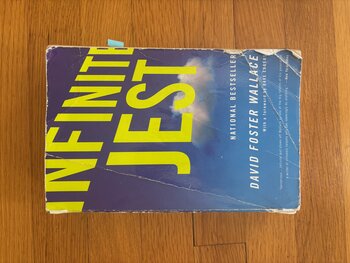I read Infinite Jest
2025-04-13

I recently watched the video I tried doing nothing on an 18 hour flight, in which YouTube creator @BWong challenges himself to spend back-to-back flights doing absolutely nothing: not even talking to his parents beside him or sleeping. Just sitting in his seat staring blankly ahead, for 18 hours straight.
In The Pale King, David Foster Wallace writes:
It is the key to modern life. If you are immune to boredom, there is literally nothing you can't accomplish.
Beyond the content of Infinite Jest, there is its form: a sprawling, dense, 1,000 page postmodern novel. A book which asserts itself as a physical object. Usually bright blue and neon-yellow, it's the most prominent item on any reader's bookshelf. It's hard to read it in public even without feeling at least somewhat self-conscious.
David Foster Wallace believes in the importance of the novel: of sitting quietely alone and working through a difficult text. Of inhabiting the mind of another in a way that no other art form allows you to do. Infinite Jest is a great book, but there's a funny sense that its story is almost secondary to its primary goal, to get you to shut up, sit still, and pay close attention for a very long time.
I read the first half of Infinite Jest in 2015, in college, then again in 2020, before finally finishing the book earlier this year. I got a lot out of it, and there's so much in the novel that it's impossible to cover completely. It's moving, thoughtful, beautiful, and fun. There are sections I can only describe as "virtuosic." It's a biting satire of American culture that is shockingly prescient. It is an honest-to-God "encyclopedic novel" of the 21st century.
But when I finished, I found myself asking, why did I do that? It's a novel that forces you to ask. Like: if I spent so much time and energy doing this, it better have had a damn point. The book has no satisfying ending: anything you get out of it, you're going to get at the beginning or the middle as much as the end. Some readers become fixated on this aspect of the text, re-reading it many times like the novel's titular Entertainment, or Steeply's father's obsession with producing meaningless pages "analyzing" the TV show MASH.
Wallace loves to talk about the hidden wisdom of cliché, so I'd say that the "point" of Infinite Jest is a "meditation on suffering." A particular kind of suffering: Post-Cold War America is characterized by an absence of meaning, of real projects or beliefs. People live lives of (unevenly distributed) material abundance, but atomized psychological anguish. The dominant answer to the "problem of suffering" in the world of Infinite Jest, and in the country it satirizes, is that the purpose of life is the individual pursuit of pleasure and avoidance of pain. But this is an empty way of living that only serves to amplify suffering's psychological dimension. As Nietzsche puts it, "what really raises one's indignation against suffering is not suffering intrinsically, but the senselessness of suffering". It is this senselessness that has escalated in contemporary America.
And so, if mindless pursuit of pleasure is a failed pursuit, we have to come to terms with our particularly (post-)modern forms of suffering: of alienation, of malaise, of, especially, restlessness and boredom. "Mild" suffering that, absent any countermeasures, amplifies itself into full-on depression, addiction, and anguish. And we have to come up with reasons to do so.
Wallace really believes in things, and he believes in believing in things. He's responding to a cultural environment in which true believers are total suckers, where eye-rolling cynicism is the only acceptable response to anyone with "real" principles, anyone who hasn't given up and given in. Repeatedly, Wallace puts his characters in situations in which it would seem insane, or even impossible to take things seriously, to be earnest, compassionate, kind, to put in daily invisible work of self-sacrifice, and yet somehow, someway find ways of doing so.
Infinite Jest takes place in the early 2010s, but Wallace might have been a bit early. It's in Johnny Gentle's 2024 administration where Wallace is more relevant than ever, where mindless entertainment has encroached upon more of our lives, where really paying attention and sitting still is even harder, and where the political and cultural environment makes living a genuine life of dedication, virtue and quiet dignity both more inconceivable and more urgent.